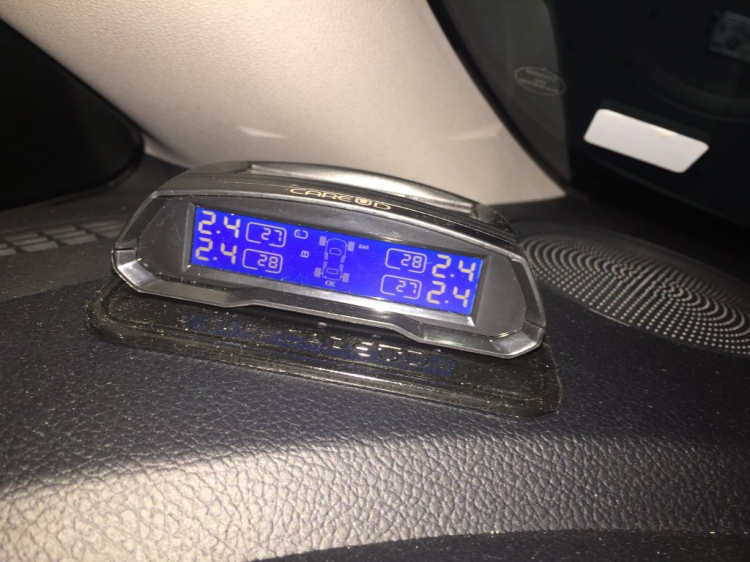Vậy sao giờ bácLần nào vào hãng bảo dưỡng mà hãng kêu bơm bánh xe thì em nói thôi để ra ngoài bơm, lần nào về bánh cũng tưng tưng căng đét thấy ghê
Chắc do để xe trên cầu nâng, bơm đúng chuẩn 2.2kg nhưng hạ xe xuống toàn bộ xác xe đè lên 4 bánh nên thành 2kg8 đấy. Em cũng toàn bị 2kg8
Bác đo áp suất lốp khi lốp nguội và xe để dưới đất bình thường. Đúng theo nhà sx khuyến cáo.Em có đồng hô đo và có cảm biến áp suất lốp luôn đều báo 2,7kg khi lăn bánh nó lên 2,8kg
vay gio hạ xuống 2,4 dc kg bác
Bác xem khuyến cáo của hảng Bridgestone, xem xong sẽ hiểu mấy ông KT Kia nào đó sao mà tào lao vậy.
Tyre Pressure Guide
Contrary to popular belief, tyre pressure is not determined by the type of tyre or its size but upon your vehicle's load and driving application i.e. speed
To find out what your car's tyre pressure should be, consult the manufacturers tyre placard usually found inside the driver's door sill, glove box, fuel filler cap or under the bonnet.
The placard also displays the manufacturers recommended tyre sizes.
Tyre pressures should be checked when the tyre is 'cold', as pressure increases as the tyre becomes 'hot'.
Take the "cold" reading and check them against the recommended tyre pressures from your placard.
Heavy loads or towing puts an extra strain on your tyres. So if your vehicle is fully loaded with passengers and luggage, the general rule is to add 28kpa (4PSI or 4lbs).
At high speed, (defined as driving at 120km/h for over one hour), your tyres will wear out twice as fast as when you drive at 70-80 km/h. If your tyres are under-inflated by twenty per cent tyre life can be reduced by thirty per cent. The rule here is to add 28Kpa (4PSI) from your Minimum Compliance Plate Pressure. Don't inflate your tyres above 40 psi or 280 kPa. When the tyres get hot from driving, the pressure will increase even more
Tyre Pressure Guide
Contrary to popular belief, tyre pressure is not determined by the type of tyre or its size but upon your vehicle's load and driving application i.e. speed
To find out what your car's tyre pressure should be, consult the manufacturers tyre placard usually found inside the driver's door sill, glove box, fuel filler cap or under the bonnet.
The placard also displays the manufacturers recommended tyre sizes.
Tyre pressures should be checked when the tyre is 'cold', as pressure increases as the tyre becomes 'hot'.
Take the "cold" reading and check them against the recommended tyre pressures from your placard.
Heavy loads or towing puts an extra strain on your tyres. So if your vehicle is fully loaded with passengers and luggage, the general rule is to add 28kpa (4PSI or 4lbs).
At high speed, (defined as driving at 120km/h for over one hour), your tyres will wear out twice as fast as when you drive at 70-80 km/h. If your tyres are under-inflated by twenty per cent tyre life can be reduced by thirty per cent. The rule here is to add 28Kpa (4PSI) from your Minimum Compliance Plate Pressure. Don't inflate your tyres above 40 psi or 280 kPa. When the tyres get hot from driving, the pressure will increase even more
Nhẹ muốn bay luôn á bácMà công nhận để 2.8kg đi nhẹ tênh, xe mạnh hơn đc vài HP kakaka
Bác xem khuyến cáo của nhà sx bên hông cửa tài, cột chữ B có thông số lốp, căn cứ vào thông số qui định đó, thêm tối đa 10% thui nếu thấy lốp xẹp quá.Em hạ xuong 2,4 dc kg bác
View attachment 539146
Anh @nguyencuong79
xe anh khuyến cáo 2,2 thì:
- khi đi xa, trời nắng nóng anh bơm 2.2
- đi gần (hàng ngày đi làm, đi công chuyện...) anh để 2.3 cũng được.
- nếu anh bơm khí ni tơ thì cứ để 2.3 bất kể đi đâu.
- thời gian kiểm tra hoặc bơm thì vào buổi sáng lúc xe chưa lăn bánh.
Đấy là kinh nghiệm bản thân gửi anh tham khảo.
xe anh khuyến cáo 2,2 thì:
- khi đi xa, trời nắng nóng anh bơm 2.2
- đi gần (hàng ngày đi làm, đi công chuyện...) anh để 2.3 cũng được.
- nếu anh bơm khí ni tơ thì cứ để 2.3 bất kể đi đâu.
- thời gian kiểm tra hoặc bơm thì vào buổi sáng lúc xe chưa lăn bánh.
Đấy là kinh nghiệm bản thân gửi anh tham khảo.
Nhìn nó xẹp vậy mới chuẩn đó bác, vì cục máy nằm ở đầu xe nên lúc nào bánh trước cũng xẹp hơn bánh sau, bác bơm thêm cho căng thì sẽ bị dư nhiều đó, dễ "bùm" 
Thong số bên đó là 2,2 do bácBác xem khuyến cáo của nhà sx bên hông cửa tài, cột chữ B có thông số lốp, căn cứ vào thông số qui định đó, thêm tối đa 10% thui nếu thấy lốp xẹp quá.
Vậy nếu bác thấy xẹp quá thì thêm 0,2kg vào.Thong số bên đó là 2,2 do bác

